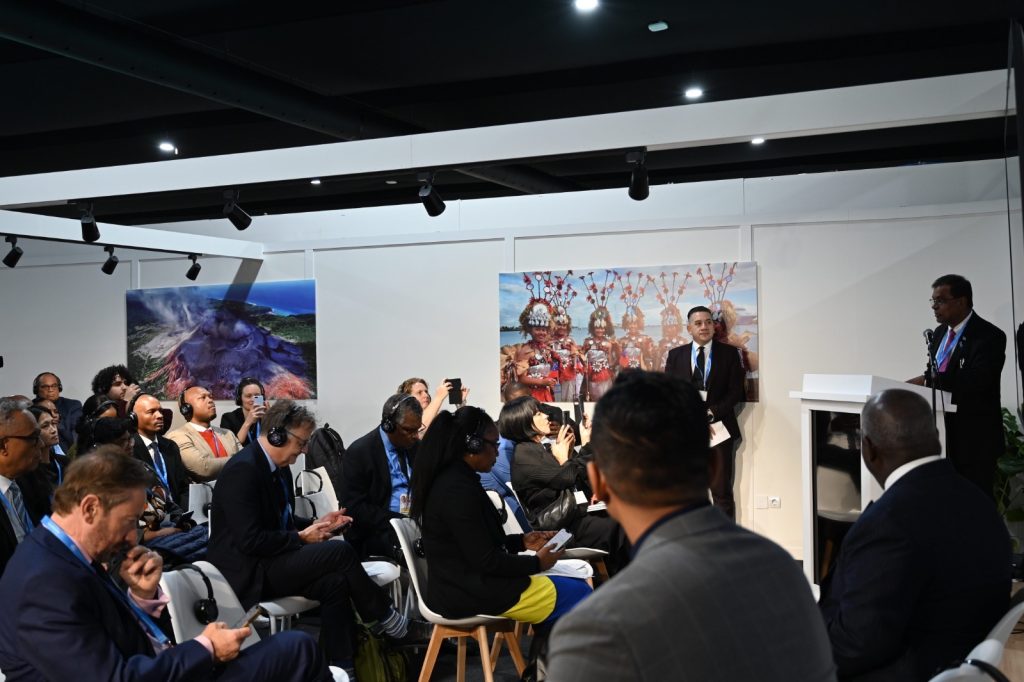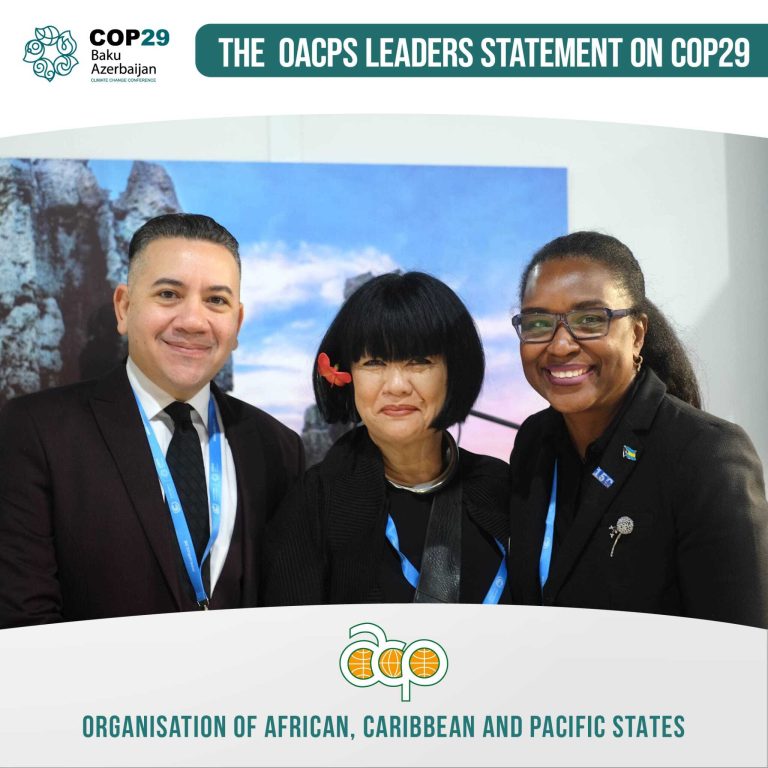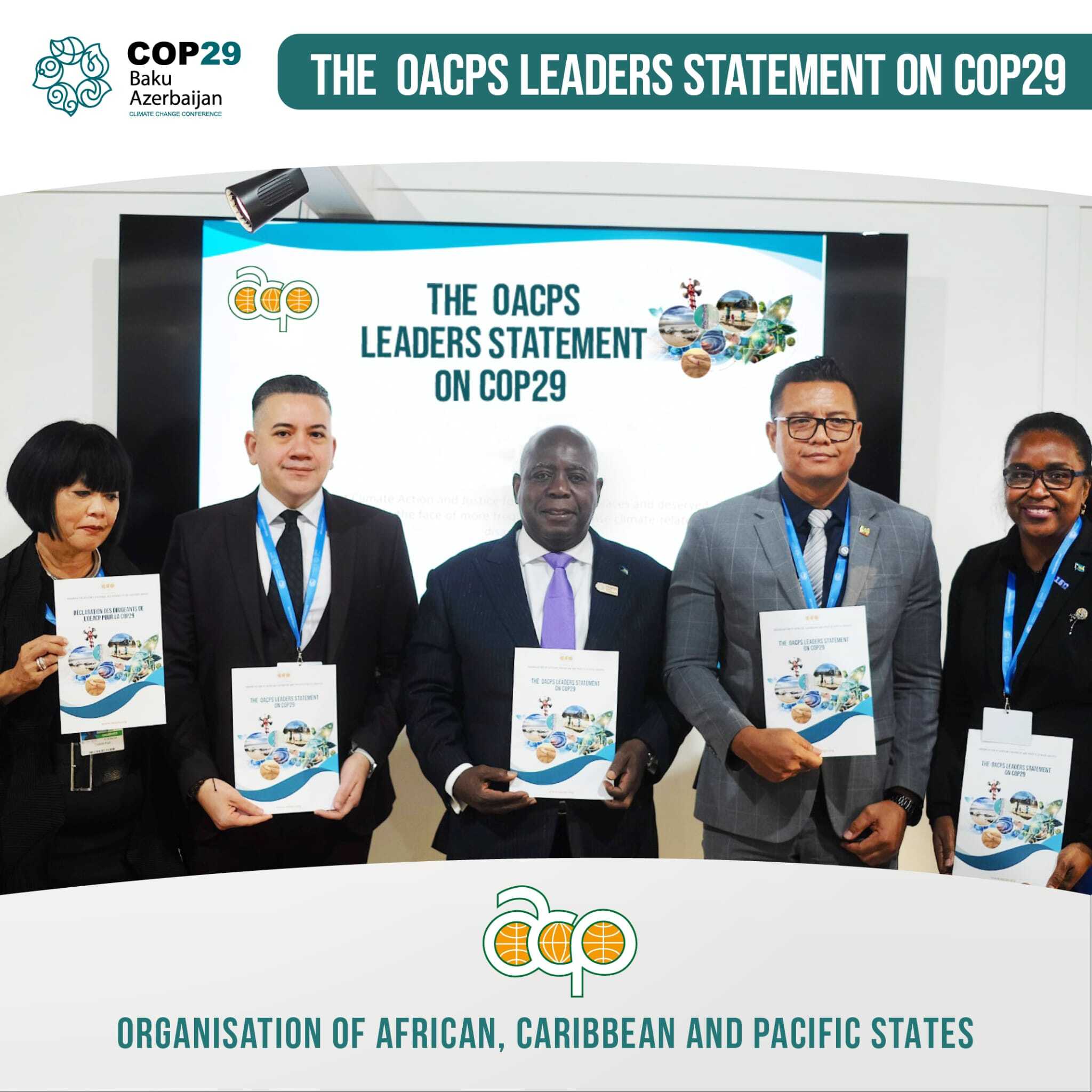Content from the OACPS COP29 Leaders Statement
This content is based on the official OACPS COP29 LEADERS STATEMENT: The Event was held in the Moana Blue Pacific Pavilion and attended by OACPS Leaders from the 79 member countries and 6 regions of the Organisation of African Caribbean and Pacific States (OACPS).
Read the full statement here: OACPS COP29 LEADERS STATEMENT (PDF).
In solidarity and unity we, the Leaders of the Organisation of African Caribbean and Pacific States (OACPS) commend the OACPS Issues Paper for COP29, and call on COP29 to send a strong political signal and commitment to deliver on key priorities, as we are faced with more frequent and intense
climate-related disasters.
We demand urgent global action on climate change, that acknowledges climate justice and historical responsibility. Our 79 countries, representing over 1.5 billion people are custodians and stewards of large parts of the Ocean and tropical Forests, which are the lungs of our Blue Planet. We have an important role to play but we are also on the frontline of the escalating climate crisis, suffering the brunt and bearing some of the heaviest of burdens, and yet contributing just 2% of the global greenhouse gas emissions.
The recent catastrophic impacts of Hurricane Beryl in the Caribbean, droughts and floods across Southern and Eastern Africa regions, as well as Tropical Cyclones Judy, Kevin, and Lola in the Pacific, are testament to the devastating, lived experiences that are wreaking havoc on our lives, livelihoods, and on our economies and long-term sustainable development prospects and aspirations.
The findings of the 2023 Global Stocktake are clear – current Nationally Determined Contributions (NDCs) are not ambitious enough, to keep the long-term temperature rise to well below 1.5°C. The projections from the IPCC reports and the UN Emissions Gap Report 2024, paint a stark and ominous picture of being on the brink of surpassing 1.5°C of warming – a threshold that, if crossed, will lead to inconceivable, irreversible damage to our ecosystems and communities.

We therefore urge all countries, especially developed nations, who are the largest emitters of
greenhouse gases, to enhance their Nationally Determined Contributions (NDCs) with substantial
cuts in greenhouse gas emissions, to limit global warming to below 1.5°C, in line with the Paris Agreement.
We express serious concern that our calls for equitable and simplified access to climate finance, to address the significant gap in financial flows to ensure a climate-resilient sustainable development, have gone unanswered for too long. We cannot wait for more disasters to prompt more pledges, to act.
We insist that it is urgent for COP 29 to secure an agreement on a New Collective Quantified Goal on Climate Finance (NCQG), set from a floor of USD 100 billion per year, which must be
regularly reviewed to reflect the evolving needs and priorities. The NCQG must be fit for purpose, and it must support the implementation of Nationally Determined Contributions (NDCs) and National Adaptation Plans (NAPs), in line with the 1.5°C Paris climate goal.
We reiterate that the climate emergency, coupled with other recent exogenous shocks, have left our countries with mounting debt levels leaving no fiscal space for our debt distressed countries to invest in urgent climate action responses. Therefore, the new finance goal should address the unsustainable debt burden, the high cost of capital, and unlock additional grant based and concessional financing at-scale, to meet developing countries’ needs to build resilience and sustainability. In this regard implementation of the Bridgetown Initiative 3.0 should be wholly embraced.
We welcome the early steps to operationalise the Loss and Damage Fund and reiterate our call that pledges made to the Fund are urgently actualised, to capitalise and launch a robust Loss and Damage Fund that takes account of the realities faced by us; and, reiterate that the Loss and Damage Fund must be standalone, to provide grant-based resources, support both economic and non-economic losses, address extreme disasters and slow onset events, consider loss and damage impacts on both land and under the ocean, and be easily accessible to all OACPS Members – SIDS, LDCs and African LLDCs.
We reaffirm the Paris Agreement global goal on adaptation, whose aim is to enhance adaptive capacity, strengthen resilience and reduce vulnerability to climate change, must be prioritised and hastened, as operationalisation has been too low and too slow for far too long.

We welcome the significant step forward, with adoption of the “United Arab Emirates Framework for Global Climate Resilience” and urge the COP 29 to sustain the momentum and reach a pivotal consensus that will pave way for a swift finalisation of the indicators for tracking targets that will act as a guide for efforts to reduce vulnerability and build adaptive capacities.
We insist that COP29 provide guidance on how developed countries will deliver the ‘’doubling of adaptation finance by 2025 based on 2019 levels”, taking into account the needs of developing
countries and facilitating access to grants and highly concessional finance for all developing countries.
We call for a COP 29 decision on National Adaptation Plans (NAPs) that will provide needed financial support – to be reflected in the NCQG – as well as technology transfer and capacity-building support to SIDS, LDCs and African LLDCs to develop and update their National Adaptation Plans by 2025.
We insist on a COP 29 decision for a robust framework for Article 6 mechanisms that is guided by effective social safeguards, environmental integrity, transparency and incorporates effective review processes.
We call for commitment to increase support for ocean-based action by the Operating
Entities of the Financial Mechanism of the UNFCCC and Paris Agreement, including the Green Climate Fund (GCF), the Global Environment Facility (GEF) and the Adaptation Fund.
We stress a COP29 outcome must secure equitable and efficient access to finance, technical, and capacity building support for SIDS, LDCs and African countries, to enable the effective implementation of the Convention and the Paris Agreement.
We reaffirm the critical importance of the International Court of Justice (ICJ) advisory proceedings on climate change, for advancing equitable responses to the climate crisis, including reparations for loss and damage.
We encourage other countries to show courageous leadership and join us in promoting
ambitious climate action and a collective will to act decisively. We are committed to working together to turn the tide of the climate crisis and build a world where climate justice prevails.



